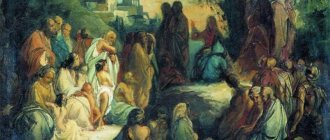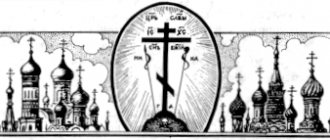The 10 commandments of Christianity are the path about which Christ said: “I am the way and the truth and the life; no one comes to the Father except through Me” (John 14:6). The Son of God is the embodiment of virtues, since virtue is not a created thing, but a property of God. Every person needs their observance in order to achieve his measure, which brings him closer to God.
The commandments of God were given to the Jews on Mount Sinai after a person’s internal law began to weaken due to sinfulness, and they stopped hearing the voice of their conscience.
Text of the Ten Commandments (Japanese translation)
- I am the Lord your God, who brought you out of the land of Egypt, out of the house of slavery; Let you have no other gods before Me.
- You shall not make for yourself an idol or any likeness of anything that is in heaven above, or that is on the earth below, or that is in the water under the earth; You shall not bow down to them or serve them, for I the Lord your God am a jealous God, visiting the iniquity of the fathers on the children to the third and fourth generation of those who hate Me, and showing mercy to a thousand generations of those who love Me and keep My commandments.
- Do not take the name of the Lord your God in vain, for the Lord will not leave without punishment the one who takes His name in vain.
- Remember the Sabbath day to keep it holy; six days thou shalt work and do all thy work in them, but the seventh day is the Sabbath of the Lord thy God: on it thou shalt not do any work, neither thou, nor thy son, nor thy daughter, nor thy manservant, nor thy maidservant, nor [thy ox]. neither your donkey, nor any of your livestock, nor the stranger who is in your gates; For in six days the Lord created heaven and earth, the sea and everything in them, and rested on the seventh day; Therefore the Lord blessed the Sabbath day and sanctified it.
- Honor your father and your mother, so that it may go well with you and that your days may be long in the land that the Lord your God is giving you.
- Dont kill.
- Don't commit adultery.
- Don't steal.
- Do not bear false witness against your neighbor.
- Thou shalt not covet thy neighbor's house; You shall not covet your neighbor’s wife, nor his field, nor his manservant, nor his maidservant, nor his ox, nor his donkey, nor any of his livestock, nor anything that is your neighbor’s.
Ten Commandments (Deut. 5:7-21)
- May you have no other gods before Me.
- You shall not make for yourself an idol or any likeness of anything that is in heaven above or that is on the earth below or that is in the waters under the earth; you shall not worship them or serve them; For I, the Lord your God, am a jealous God, punishing the children for the iniquity of the fathers to the third and fourth generation of those who hate Me, and showing mercy to a thousand generations of those who love Me and keep My commandments.
- Do not take the name of the Lord your God in vain; For the Lord your God will not leave without punishment the one who takes His name in vain.
- Remember the Sabbath day, to keep it holy, as the Lord your God commanded you; Six days you shall work and do all your work, and the seventh day is the Sabbath of the Lord your God. On it you shall not do any work, neither you, nor your son, nor your daughter, nor your manservant, nor your maidservant, nor your ox, nor your donkey, nor any of your livestock, nor your stranger who is with you, so that the servant may rest. yours, and your servant and your donkey, as are you; and remember that you were a slave in the land of Egypt, but the Lord your God brought you out from there with a strong hand and an outstretched arm, therefore the Lord your God commanded you to observe the Sabbath day and keep it holy.
- Honor your father and your mother, as the Lord your God commanded you, so that your days may be long, and that it may go well with you in the land that the Lord your God is giving you.
- Dont kill.
- Don't commit adultery.
- Don't steal.
- Do not bear false witness against your neighbor.
- You shall not covet your neighbor's wife, and you shall not covet your neighbor's house, nor his field, nor his manservant, nor his maidservant, nor his ox, nor his donkey, nor any of his livestock, nor anything that your neighbor has.
Book of Commandments. Commandments "Thou shalt not": 21-25
Prohibitions related to objects of idolatry.
21st commandment -
prohibition for the tempted person to hide the guilt of the tempter by keeping silent about the facts necessary for a guilty verdict.
And about this is His saying, may He be exalted: “... And do not cover it
” (
Devarim
, ibid.).
And it is explained ( Sifri
, ibid.): ““Do not cover it” - i.e. if you know the facts that expose him, you have no right to remain silent.”
22nd commandment -
prohibition on using or benefiting from the ornaments used to decorate idols.
And about this is His saying, exalted be He: “ Do not desire to take for yourself the silver and the gold that is in them
” (
Deuteronomy
7:25).
In the Sifra
(
Vayikra
) it is explained that “it is prohibited to profit from the materials that were used to cover idols, because It is said: “You shall not desire to take for yourself the silver and the gold that is in them.” Anyone who violates this prohibition is punishable by scourging.
The laws related to the fulfillment of this commandment are explained in the third chapter of Tractate Avodah Zara
(45a).
23rd commandment -
prohibition to rebuild
ir anidahat
(the city in which the Jews turned to idolatry /D 186/).
And about this is His saying, may He be exalted: “And let it forever be a heap of ruins; do not rebuild it again
” (
Deuteronomy
13:17). And everyone who restores and rebuilds this city is punishable by scourging.
The laws associated with the fulfillment of this commandment are explained in the 10th chapter of Sanhedrin
(111b, 113a).
24th commandment -
prohibition to use or benefit from the property of
ir anidahat
(the corrupted city).
And about this is His saying, may He be exalted: “ Let nothing that is destroyed stick to your hand
” (
Deuteronomy
13:18). And whoever takes for himself any of this property is punished by scourging.
The laws associated with the fulfillment of this commandment are explained in the 10th chapter of Sanhedrin
(111ab).
25th commandment -
prohibition of purchasing anything related to idolatry.
We must move as far as possible from objects of idolatry, from the temples and idols of idolaters, from any objects of their cult. And about this is His saying, may He be exalted: “ And do not bring filth into your house
” (
Deuteronomy
7:26). Anyone who acquires objects of their cult or benefits from them is punished by scourging.
At the end of the treatise Makot
(22a) it is explained that the one who cooks on a fire, supporting it with logs split from
an asherah
- a cult tree, is punished by scourging twice: the first time for violating the prohibition “And you shall not bring filth into your house”, and the second time for violating prohibition “Let nothing that is destroyed stick to your hand (after all, he benefited from what should have been destroyed)” (
Devarim
13:18). Understand that.
The laws associated with the fulfillment of this commandment are explained in chapter 3 of Tractate Sanhedrin
.
Reprinted with permission from Shvut Ami Publishing House
Share this page with your friends and family:
What's up
Ten Commandments (Ex.34:14-26)
Text from the book of Exodus according to the Synodal translation.
10 And [the Lord] said to Moses: Behold, I make a covenant: before all your people I will do miracles such as have not been done in all the earth or among any people; and all the people among whom you are will see the work of the Lord; for what I will do for you will be terrible;
11 Keep what I command you this day: behold, I am driving out from before you the Amorites, the Canaanites, the Hittites, the Perizzites, the Hivites, the Girgashites, and the Jebusites;
12 Be careful that you do not enter into an alliance with the inhabitants of the land into which you enter, lest they become a snare among you.
13 Destroy their altars, break down their pillars, cut down their sacred groves, [and burn the images of their gods with fire],
14 For you must not worship any god other than the Lord [God], for His name is Jealous; He is a jealous God.
15 Do not enter into an alliance with the inhabitants of the land, lest when they commit fornication after their gods and offer sacrifices to their gods, they invite you too, and you eat their sacrifices;
16 And do not take wives from their daughters for your sons, lest their daughters, having committed harlotry after their gods, cause your sons to commit harlotry after their gods.
17 Do not make for yourselves cast gods.
18 You shall observe the Feast of Unleavened Bread: for seven days you shall eat unleavened bread, as I commanded you, at the appointed time in the month of Abib, for in the month of Abib you came out of Egypt.
19 Everything that opens lies is mine, as are all your male cattle that break lies, oxen and sheep;
20 You shall replace the firstborn of the donkeys with a lamb, and if you cannot replace it, then redeem it; Redeem all the firstborn of your sons; Let them not come before Me empty-handed.
21 Work six days, and rest on the seventh day; rest during sowing and harvest.
22 And you shall celebrate the Feast of Weeks, the Feast of the Firstfruits of the Wheat Harvest, and the Feast of Gathering in at the end of the year;
23 Three times a year all your males shall appear before the Sovereign, the Lord God of Israel,
24 For I will drive out the nations from before you and enlarge your borders, and no one will covet your land if you appear before the Lord your God three times a year.
25 You shall not shed the blood of My sacrifice on leaven, and the sacrifice of the Passover shall not remain overnight until the morning.
26 You shall bring the very first fruits of your land into the house of the Lord your God. Do not boil a kid in its mother's milk.
27 And the Lord said to Moses, Write these words to yourself, for in these words I make a covenant with you and with Israel.
28 And [Moses] remained there with the Lord forty days and forty nights, eating no bread or drinking water; and [Moses] wrote on the tablets the words of the covenant, the ten chapters.
Gospel commandments
Gospel commandments
Peace be with you, dear visitors of the Orthodox website “Family and Faith”!
Before you is a spiritual article devoted to the importance of fulfilling the Gospel commandments, on which the Orthodox faith is based.
God is the purest Spirit, the image and likeness of God - in the properties of the human soul: immortality, free will, reason, the ability for true love. If a person wants to enter the Kingdom of Heaven after his earthly life, God gave him His commandments to keep.
The commandments of the Decalogue (Old Testament) preserved in man the ability to accept the commandments of the Gospel. In the new covenant, for the inheritance of the Kingdom of Heaven, keeping the Old Testament commandments is not enough; keeping the commandments of the Gospel is necessary.
Gospel commandments in relation to God
Love the Lord your God with all your heart, and with all your soul, and with all your mind. This is the first and greatest commandment. The second is similar to it: Love your neighbor as yourself (Matthew 22:37-39).
Whoever is ashamed of Me in this adulterous and sinful generation, of him I will also be ashamed before My Father (Mark 8:38). Silence during someone’s ungodly speech is also a betrayal of God.
He who loves father or mother more than Me is not worthy of Me: and he who loves son or daughter more than Me is not worthy of Me: and he who does not accept his cross and comes after Me is not worthy of Me (Matthew 10:37). This applies to any attachments of this world.
But you, when you pray, go into your room and, having shut your door, pray to your Father who is in secret; and your Father, who sees in secret, will reward you openly (Matthew 6:6). Only prayer with fear and attention is heard by God, and not in mechanical language.
When you fast, anoint your head and wash your face, so that you who are fasting will not appear to men, but to your Father who is in secret; and your Father, who sees in secret, will reward you openly (Matthew 6:17).
He who loves Me keeps My commandments (John 14:21).
Gospel commandments towards neighbors
This is My commandment, that you love one another as I have loved you. Greater love has no one than this, that someone lay down his life for his friends (John 15:12-13).
Come, you blessed of My Father, inherit the kingdom prepared for you from the foundation of the world: for I was hungry, and you gave Me food; I was thirsty and you gave Me something to drink; I was a stranger and you accepted Me; I was naked and you clothed Me; I was sick and you visited Me; I was in prison, and you came to Me; just as you did it to one of the least of these brothers of Mine, you did it to Me (Matthew 25:34). One of My smaller brothers - our neighbor - is every person we meet in life: at home, at work, on the street, etc. Those. Christ judges how we treat Him by how we treat our neighbors.
Bear one another's burdens and thus fulfill the law of Christ (Gal. 6:2).
Until seventy times seventy times (until infinity), forgive your brother who sins against you (Matthew 18:21-22).
Make peace with your opponent quickly, while you are still on the road with him (while you are in this earthly life), lest your opponent hand you over to the judge, and the judge hand you over to the servant, and they throw you into prison (Matthew 5:25 ).
Judge not, lest ye be judged (Matthew 7:1).
Forgive and you will be forgiven (Matthew 6:14).
Everyone who hates his brother is a murderer (John 3:15). Anyone who is angry with his brother without cause is subject to judgment. Whoever says, “You are a fool” (and scolds another person) is subject to fiery hell (Matthew 5:22).
Lies are from the devil and the father of lies is the devil (John 8:44). Any lie, even the smallest one, is service to Satan.
Woe to you when all men speak well of you (Luke 6:26).
Anyone who looks at a woman with lust has already committed adultery with her in his heart; whoever divorces his wife, except for the guilt of adultery, gives her a reason to commit adultery; and whoever marries a divorced woman commits adultery (Matt. 5:28). This applies to married men and women, boys and girls, all people.
When you give alms, do not let your left hand know what your right hand is doing, so that your almsgiving may be in secret; and your Father, who sees in secret, will reward you openly (Matthew 6:2).
Give to everyone who asks you, and do not demand back from the one who took what is yours (Luke 6:30).
Whoever wants to be greater among you must be your servant; and whoever wants to be first among you must be your slave (Matthew 20:26).
Don't swear at all. But let your word be: yes, yes; no no; and anything beyond this is from the evil one (Matthew 5:34).
Render unto Caesar the things that are Caesar's, and unto God the things that are God's (Mark 12:17). Let every soul be subject to the higher authorities, for there is no authority except from God (Rom. 13:1).
Do not resist evil. But whoever strikes you on your right cheek, turn the other also to him; and whoever wants to sue you and take your shirt, give him your outer clothing too; and whoever forces you to go one mile with him, go with him two miles (Matthew 5:39). Do not repay evil for evil (Rom. 12:17).
Love your enemies so that you may be sons of your Father in Heaven. And if you greet only your brothers, what special thing are you doing? Don't the pagans do the same? (Matt. 5:45).
Gospel commandments in relation to yourself
Learn from Me that I am meek and lowly in heart, and you will find rest for your souls (Matthew 11:29).
Repent for the Kingdom of Heaven is at hand (Matthew 3:2). Constantly being in a state of repentance gives rise to humility.
Pray without ceasing (1 Thess. 5:17). Constant aspiration towards God.
He who does not eat My Body and drink My Blood does not have life in himself (John 6:53).
Woe to you who laugh now! for you will mourn and lament (Luke 6:25). Blessed are those who mourn, for they will be comforted (Matthew 5:4). The only saving cry for a person is about his sins.
Everyone who exalts himself will be humbled, and everyone who humbles himself will be exalted (Luke 14:11).
Woe to you, rich people! Woe to you who are now satiated! for you will hunger (Luke 6:24-25). You cannot serve God and mammon (wealth) (Matthew 6:24). Looking for something more than necessary (food, clothing, shelter over your head).
Do not love the world, nor the things in the world (1 John 2:15). The whole world lies in evil (1 John 5:19). Love of the world is enmity against God (James 4:4). The world is a life of pleasures and material prosperity; it lives according to laws contrary to the Gospel and seeks its own.
Seek first the kingdom of God and His righteousness, and all other things will be added to you (Matthew 6:33).
Do not be afraid of those who kill the body but cannot kill the soul (Matthew 10:28).
So, whoever breaks one of the least of these commandments and teaches people to do so, he will be called the least in the Kingdom of Heaven (Matthew 5:19). If he is called the least, it means that such a person will not exist in the Kingdom of Heaven. - So God will judge us after our earthly life, according to the commandments of Christ, as Jesus Christ said about Himself: “I am the way, and the truth, and the life: no one will come to the Father but by Me” (John 14:6).
Three conditions for God to forgive sin in confession:
- admit that you have committed a sin - admit a sin for a sin;
- sincerely repent of committing this sin;
- not want to commit this sin in the future (turn away from sin).
If a person does not want to part with some of his passions or even loves it, saying that for work he needs to behave this way or look this way, or that he will be bored without this passion, etc., Christ cannot enter the heart at Communion , where at least one passion lives calmly, like a snake, where they feed it and do not try to drive it out. Instead of Christ, Satan enters there. Communion turns out to be unworthy. By analogy with Judas, who at the Last Supper accepted the Body and Blood of Christ, and immediately Satan entered into him. And Judas ran and brought soldiers and betrayed the Lord, and then hanged himself. So, when receiving unworthy Communion, a person is either attacked by some kind of gloomy despondency, or is strongly drawn to some kind of passion, sin, or the person falls ill, etc.
Another person basically does not see his sins and the manifestations of passions in his heart, but he sincerely repents of the sins that he sees. The heart of such a person is like a leaky vessel - the grace of the Communion of the Body and Blood of Christ quickly spills out of it, if it does not flow at all, as if through a gutter. The same thing happens when you don’t pay attention to your “minor” sins (immediately repent of them and bring them to confession), because the bag of sand of these sins is pulled to the bottom in the same way as the stone of grave sin.
A sign of the presence of Christ received in Communion in a person’s heart is the person’s easy performance of good deeds according to the Gospel commandments (joy, peace, mercy, meekness, abstinence, kindness, long-suffering, love). This state of the heart is also the key to inheriting the Kingdom of Heaven after a person’s death. Sin is separation from God, service to Satan. But not committing a sin is not a sufficient condition for the salvation of the soul; good deeds are needed. In this, Christians differ from other people, some of whom by nature (conscience) do what is lawful. Another sign of worthy Communion is the discovery by a person of the ability to resist sin, the weakening of the action of all passions.
We go to church, pray, fast, regularly confess, remembering mainly the 10 Old Testament commandments, even after Communion we can feel some peace - we are complacent about our Christian life - and Satan can help everyone in this, feeding the passion of vanity, and in such a state bring us until our death. This is the secret of Satan.
After the fall of the first people, the grace of the Holy Spirit left the heart of man, and Satan immediately entered his heart. With our inattention to our sins after Baptism and Communion, God's grace quickly leaves our heart. We remain receptive to sin; the Gospel commandments seem difficult to fulfill. Sin has become our second nature. Passions have penetrated so deeply into us that renunciation of sin has become renunciation of oneself, therefore the Lord says: “If anyone wants to come after Me, deny himself, and take up his cross, and follow Me” and again: “Whoever wants to save his soul , he will lose it, but whoever loses his life for My sake will find it” (Matthew 16:24-25).
Contrition of the heart (breaking the stone shell of the heart - pride) is the first step on the path of salvation, without which God's grace cannot enter the human heart. God does not violate human freedom and does not correct him by force.
The mind is the king in the soul of a Christian. First the mind learns faith; seeing one’s sins and manifestations of passions in oneself (with the assistance of God’s grace and contrition of heart). Then the mind, sitting on the throne, cuts off all selfish and sinful feelings, desires, and emotions rising from the heart, accepting into itself only those that are saving for its soul. The mind teaches the heart to feel correctly, and sooner or later the heart responds with a reciprocal feeling. The mind also rejects all demonic thoughts coming from outside. He puts thoughts, if necessary, into the tongue to put them into words. At the same time, the mind is constantly occupied with the memory of God - calling on Him.
A Christian struggles with his passions, performing the opposite virtues: with condemnation - humility; with envy - love; with worldly acquisition - generosity; with anger - meekness; with sadness (sorrows in life) - trust in God; with despondency (desire for the entertainment of this world) - with zeal and hard work; with vanity - shame. He knows that good-natured patience with undeserved insults especially appeases God. He considers himself worse than everyone else because he looks only within himself and sees his many sins. And if he sees or hears about someone sinning, he does not judge him, because... I have much more sins.
The cross of a Christian is a chain of life circumstances where he struggles with passions within himself, struggles with himself. A Christian meekly accepts all sorrows, temptations, troubles, illnesses as means necessary for the salvation of his soul, saying: “Glory to Thee, Lord,” “Thy judgments are right, Lord.” Acceptance and patient enduring of sorrows and illnesses with correction of oneself are necessary conditions in order to make one’s cross salvific (all people grieve and get sick, but few are saved, even among Christians). A Christian constantly subordinates his will to the will of God (according to which everything in the world happens), completely trusts the Providence of God in all life situations (there is no such evil that God has not turned to our benefit).
It is easy for him to bear this cross according to the word of the Savior: “My yoke is easy and my burden is light” (Matthew 11:30), because he bears it with gratitude to God for the atonement of his sins and does not blaspheme God with murmuring and disobedience.
according to the works of St. Ignatius (Brianchaninova)
Schema-Archimandrite Joachim (Parr) - about love
Aphorisms of St. Feofana in poetry. Page 8
Traditional understanding
In Judaism
Parchment with the text of the Decalogue from the Sephardic synagogue of Esnoga. Amsterdam. 1768 (612×502 mm)
- You shall not take the name of the Lord your God in vain [literally “falsely” - that is, during an oath], for the Lord will not leave without punishment the one who takes His name in vain [falsely].
- Don't kill. In original: " ". The verb used "" denotes immoral premeditated murder (cf. English murder), as opposed to any killing at all, for example, as a result of an accident, in self-defense, during war or by a court order (cf. English kill). (Since the Bible itself prescribes the death penalty by court order for breaking certain commandments, this verb cannot mean murder at all, under any circumstances)
- Thou shalt not commit adultery [in the original, this word usually refers only to sexual relations between a married woman and a man other than her husband]. According to another opinion, this commandment includes all the so-called “prohibitions of incest,” including incest and bestiality.
- Don't steal. The prohibition against theft of property is also set forth in Lev. 19:11. Oral tradition interprets the content of the commandment “Thou shalt not steal” in the Ten Commandments as prohibiting the abduction of a person for the purpose of enslavement. Since the previous commandments “do not kill” and “do not commit adultery” speak of sins punishable by death, one of the principles of interpretation of the Torah prescribes that continuation should be understood as a severely punishable crime.
- “Thou shalt not covet...” This commandment includes the prohibition of theft of property. According to Jewish tradition, theft is also “theft of an image,” that is, the creation of a false idea about an object, event, person (deception, flattery, etc.).








